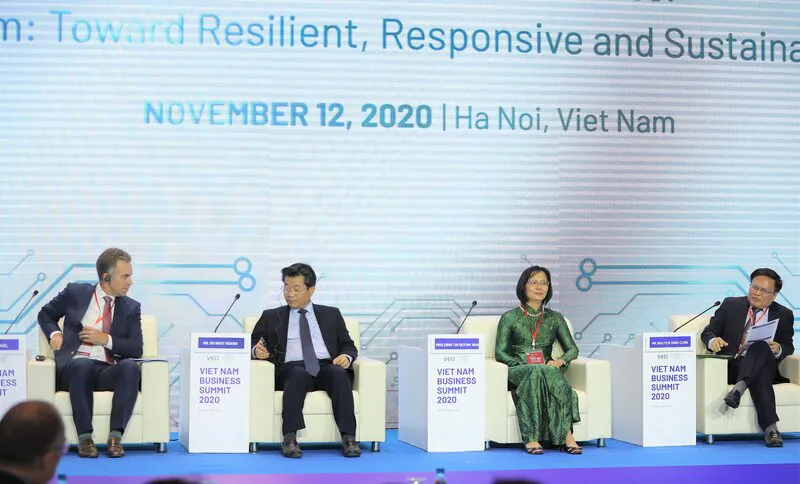Vietnam businesses urged to rethink towards sustainable and digital future
Covid-19 has revealed, and even deepened the skills gaps between the current skills and what required to deliver an agile fit-for-the-future business strategy, stated a PwC Vietnam senior executive.
To build resilience and emerge stronger through this health crisis, businesses in Vietnam need to rethink business structure, embrace digitalisation, and engage the workforce in a more sustainable way, according to Dinh Thi Quynh Van, general director of PwC Vietnam.
Dinh Thi Quynh Van, general director of PwC Vietnam. |
Ms. Van made the suggestion at the Vietnam Business Summit (VBS), one of Vietnam’s largest international business events organized annually by the Vietnam Chamber of Commerce and Industry (VCCI) on November 12.
Under the theme “Digitized Vietnam: Toward Resilient Responsive and Sustainable Development”, the summit provided a platform for leaders from both the public and private sectors to engage in an open dialog on the development of key sectors, share experiences of businesses who have found success in Vietnam, and discuss investment opportunities in the digital era. This year the event received participation of around 300 representatives from the business community in Vietnam and foreign investors.
Against the backdrop of Covid-19, the summit program covered three key areas: Vietnam's investment climate and opportunities, smart logistics to enhance its position in the global value chain, and the advancement of high-tech agriculture.
Overview of the discussion session at the VBS 2020. |
Vietnam economic resilience in the spotlight
Although Vietnam is not immune to the global economic downturn, the country has managed a rare growth of 2.9% in 2020 as projected by the World Bank’s report in August -- making it the only economy in ASEAN that can hold on to a positive growth rate this year, stated Ms. Van, adding this could be largely attributable to some very early and concerted actions taken by the government and the ensuing effective relief measures.
“The impacts of the Covid-19 on both global and local scale are increasingly evident and making enduring changes to the economic landscape. Vietnam’s bright prospect for recovery can be considered remarkable in this context of global downturn. However, to get out of this crisis stronger and in better shape, Vietnam shall be ready to navigate new challenges and opportunities ahead,” she noted.
Engage in a more sustainable way to reinvent the future
In the recent global CEO Panel Survey by PwC in July 2020, two key themes emerged among global CEOs when being asked about their priorities in a Covid-19 world: the emphasis on digitalization and the future of more employee-oriented workforce. Specifically, 41% CEOs have top priority to make their companies more digital and virtual, and 26% CEOs plan to develop a more flexible and employee-oriented workforce.
These trends were also deeply reflected in the summit discussion.
“This is the time for businesses to look back at their business models, assess internal capabilities and make realistic plans for different scenarios ahead. To navigate this new world of uncertainties, businesses need to adopt new mindsets, embrace digitalization and proactively make changes to their businesses,” added Ms. Van.
Covid-19 is accelerating the digital economy, allowing companies who are ahead of the digital transformation journey to have major advantages. According to the same PwC CEO panel survey, 76% of CEOs believe the shift to automation will be enduring, meaning that there will need to be significant resources to facilitate digital transformation including upskilling their people. Going forward, a lot of focus will be placed on what companies need to do to improve the digital capabilities of the workforce.
“Covid-19 has revealed, and even deepened the skills gaps between the current skills and what required to deliver an agile fit-for-the-future business strategy. The need to upskill is an urgent yet complex problem that will require decision-makers — from both the government and businesses — to come together,” she concluded.


.jpg)











